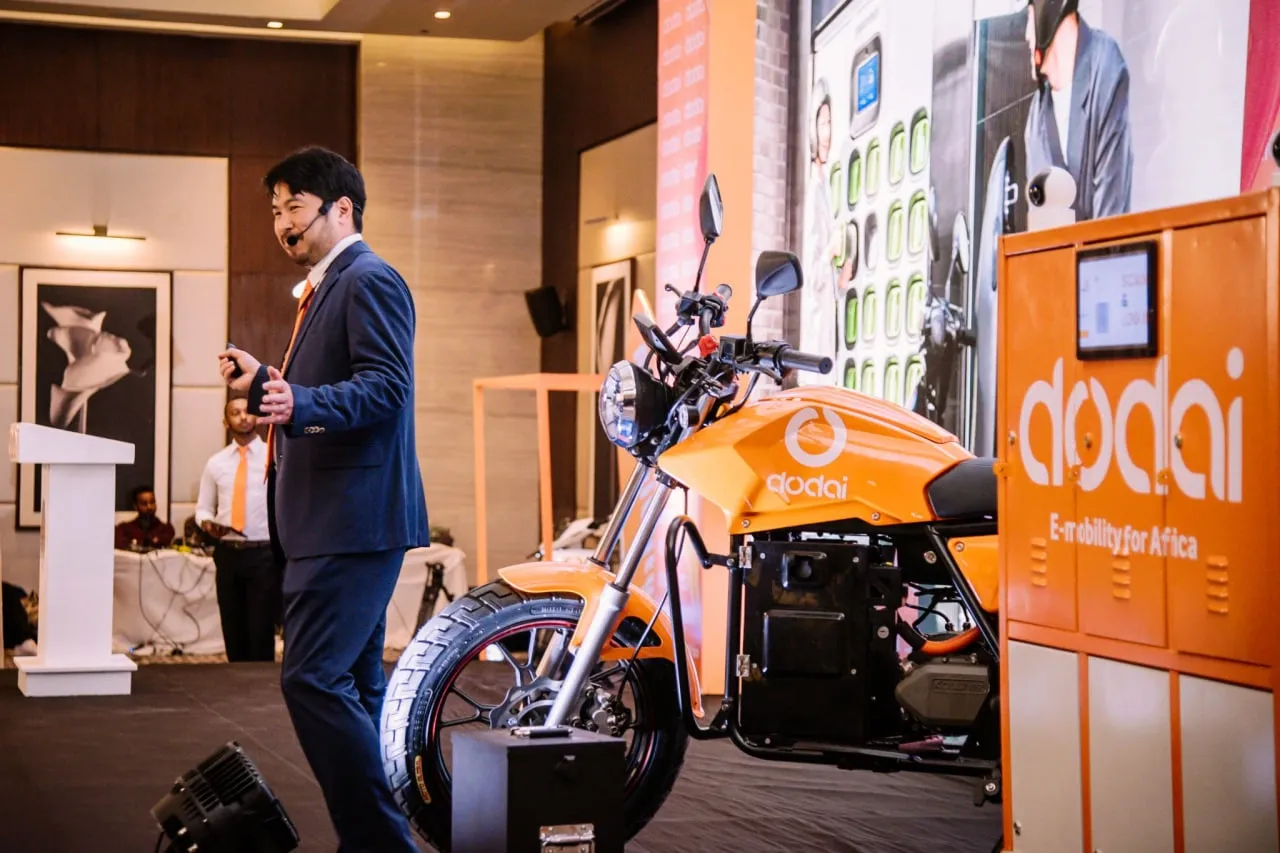Progress for 0 ad
Progress for 1 ad
Progress for 2 ad
Progress for 3 ad



Etenat Awol
Addis Ababa, Ethiopia

Ethiopia’s green mobility aspirations were boosted by a landmark partnership between Addis Ababa-based electric vehicle (EV) startup Dodai and the Ethiopian Investment Holdings (EIH) over the past week.
The agreement will see Dodai receive support from the government's investment arm to deploy 100 battery swap stations in the capital over the next year, with plans to expand to 300 stations over three years.
“Battery swapping is specifically designed for urban environments, making it an ideal solution for e-mobility in Ethiopia’s major cities,” says Yuma Sasaki, Dodai CEO & founder.
While no exact figures have been disclosed, investments between 30 and 40 million dollars are estimated over three years.
“The total cost of building the network will depend on the scale and quality of the battery swap network and operations,” Yuma told Shega. “And Dodai will make a significant investment to establish the infrastructure.”
According to the agreement, EIH will facilitate access to infrastructure and help navigate the regulatory framework. The sovereign wealth fund will also play a major role in securing access to land for the battery swap stations. Through one of EIH’s portfolio of enterprises, the Ethiopian Electric Utility (EEU), a reliable and continuous supply of electricity is also ensured across the stations.
For a country that has taken drastic steps toward EV adoption, the lack of charging stations has been cited as a major hurdle. Yuma states electric bike users in Addis Ababa currently face challenges like limited access to reliable charging facilities, long charging times, and high initial purchase costs. Battery swapping offers a practical solution to these issues, making e-mobility more accessible and attractive, according to the founder.
Battery swapping stations can potentially reduce the initial purchase cost of electric bikes by 50%, as users do not need to buy or own the battery, which represents half of the total cost. Centralized management of batteries also extends their lifespan and ensures reliable performance.
Initially, the battery swap stations will have human staff to help users learn how to use them while there are long-term plans for full automation.
The number of EV motorcycles in the country remains low, with the other key player in the sector being Tom Renewable Electric Bike Assembly, established in 2018. Dodai has reported sales of just over 400 bikes.
“We are building infrastructure for future demand, not just based on the current situation. Similar to expanding data centers or increasing internet capacity, the demand for electric mobility is expected to grow exponentially. Establishing 100 stations is the minimum requirement to support the expected demand and provide convenience for electric motorbike users across Addis Ababa,” Yuma noted.
The partnership is the second major regulatory breakthrough for Dodai, which raised $4 million in its Series A round seven months back, marking one of the largest amounts raised by startups in Ethiopia in a single round.
In April 2024, the Addis Ababa city administration implemented a complete ban on fuel-powered motorcycles, phasing them out in favor of electric ones.

Yuma’s entry into Ethiopia coincided with the government’s ongoing efforts to transition away from a reliance on internal combustion engines. Through its latest partnership with the biggest sovereign wealth fund in Africa, Dodai is poised to scale up and diversify its operations.
“By investing in alternative energy sources and scalable ventures, EIH is securing sustainable returns while also establishing a robust alternative energy infrastructure,” said EIH CEO Brook Taye (PhD). The former director general of the Ethiopian Capital Market Authority also mentioned the potential of the partnership in terms of job creation and Ethiopia’s Climate Resilient Green Economy.
Battery swapping has seen rapid growth in countries like China, India, and Taiwan over the past decade. It’s also expanding quickly in African cities like Nairobi, Kenya, and Kigali, Rwanda, in recent years. As Ethiopia further champions green mobility, the stations play a crucial role in facilitating the transition.
Following the nation's adoption of green mobility-friendly legislation over the past five years, the number of electric vehicles in the country has risen sharply to around 100,000 in 2024. This surge is estimated to contribute to a 30% EV penetration by 2030.
Government policies like near-zero tariffs for the import of fully assembled EVs and semi-knocked-down options, a ban on importing fuel-powered vehicles for private use, and tax breaks have fueled this growth. However, pervasive concerns regarding charging stations have persisted, with less than 100 available nationally.
With the hopes of addressing this concern, Ethiopia’s Petroleum & Energy Authority drafted a directive that looks to leverage the existing infrastructure of gas stations by adding an electric alternative. The draft policy also outlines size specifications, licensing processes, and pricing models for establishing EV charging stations.
EV adoption also plays a major role in helping the Ethiopian government minimize its foreign exchange expenditure on fuel imports, which surged to 6 billion dollars in 2023. As part of its 10-Year Perspective Development Plan from 2021 to 2030, the Ethiopian government plans to import 4,800 electric buses and 148,000 electric automobiles.
👏
😂
❤️
😲
😠

Etenat Awol
Etenat holds a degree in Journalism and her master's in Public Relations. Previously, she served as a university lecturer and has five years of experience in communications, media, digital marketing, and consulting.
Your Email Address Will Not Be Published. Required Fields Are Marked *